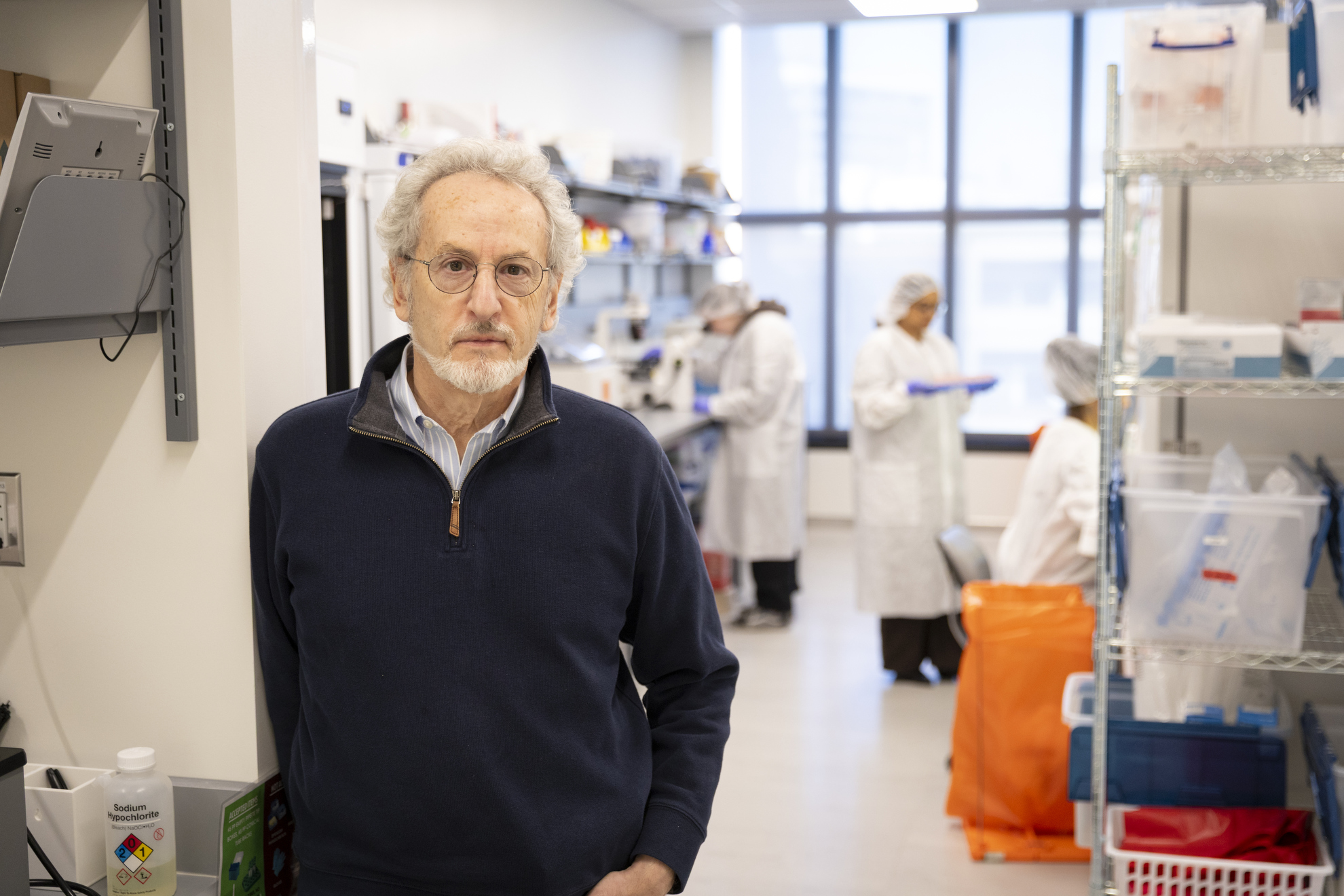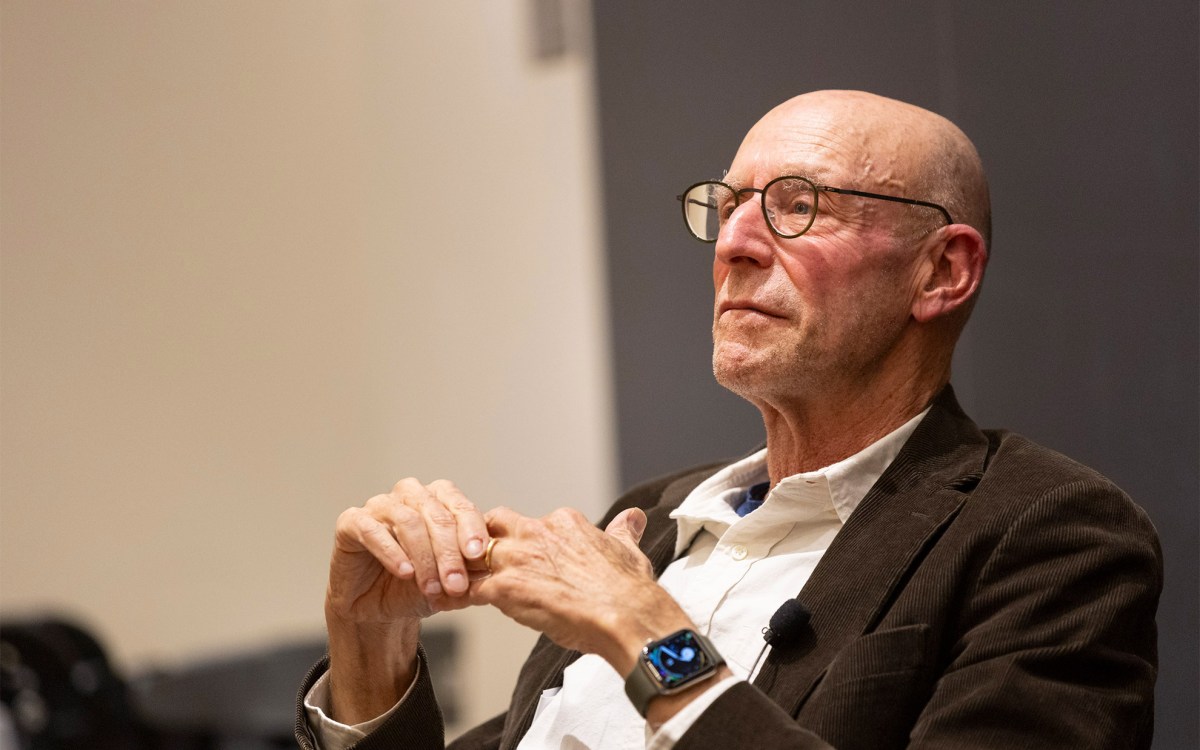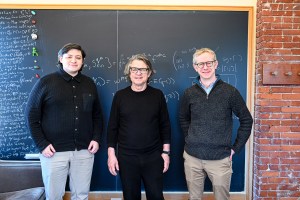He got the stop-work order. Then the scrambling began.

Niles Singer/Harvard Staff Photographer
Wyss’ Don Ingber details rush to hold onto consequential projects, talented researchers — and system that has driven American innovation
It was just hours after Harvard rejected the Trump administration’s demands that the stop-work order arrived in Don Ingber’s inbox.
Ingber, the Wyss Institute for Biologically Inspired Engineering’s founding director, said the April 14 order targeted two of his organ-on-a-chip projects, which together had more than $19 million in multiyear contracts with a unit of the U.S. Department of Health and Human Services.
Ingber, who is also a professor at Harvard Medical School and the Harvard John A. Paulson School of Engineering and Applied Sciences, was among many University researchers who received such orders after the government froze some $2.2 billion in research funding to the University.
The move came in response to Harvard’s rejection of demands that included changes in governance, hiring and admissions, and audits of student, faculty, and staff opinions. A week later, Harvard filed a lawsuit, calling the demands an illegal and unconstitutional overreach and asking for funding to be restored.
After Ingber received the order, work halted but the scrambling — and uncertainty — began for everyone with a direct stake in the projects, including researchers, students, and postdoctoral fellows, he said.
With Harvard and the federal government at odds, with lawsuits filed, and after watching the Trump administration take dramatic steps in other areas only to walk them back, Ingber said he is reluctant to do anything permanent like layoffs.
“This is a stop-work order that could end next week, especially with the lawsuit going,” he said. “We’re going to take care of the people first. The projects need to stop in terms of expending funds, but if there’s spaces on other grants, we’re shifting people to them. We’ll try to find internal funds to keep them going at least until we figure out what’s going on.”
But decisions needed to be made quickly about how to wind down projects. Experiments halted midstream would likely be lost, as would the progress of students and postdoctoral fellows working on theses or papers based on those projects. There has also been a scramble to protect people, Ingber said, by finding places for them in other projects.
The research itself is also of consequence.
Ingber’s primary project uses organ-on-a-chip technology developed at the Wyss to investigate radiation damage to human lung, intestine, bone marrow, and lymph node, providing a tool to both model damage to tissues lining the chip’s tiny channels and identify new drugs that might ameliorate damaging effects.
Ingber said the research is particularly important given the administration’s plans to ramp up nuclear power production to support the energy-intensive artificial intelligence industry.
But even without AI, the project would be useful in modeling radiation damage to human organs in the event of an accident at a nuclear reactor, for cancer patients who undergo radiation therapy, and — in a worst-case scenario — a nuclear bomb explosion.
“What has driven the economy over the past 50 years is America’s innovation engine that fosters sciences which fuel technology development, driven by the pact between the government and academia.”
The second project uses organ-on-a-chip technology to model the effects of microgravity and radiation exposure on astronauts in spaceflight. Scheduled to be aboard the Artemis II mission to the moon, the specialized chips incorporate the astronauts’ own cells to investigate the impact of spaceflight on bone marrow — where blood cells arise.
“Once you get past the Earth’s atmosphere, solar flares generate incredibly high energy radiation that can be lethal,” Ingber said. “Astronauts will undoubtedly be exposed on a long flight to Mars and you can’t just put them up in a capsule made of lead, which is what some people might suggest, because weight is critical to getting out of the atmosphere. Unless we solve that problem, we’re not going to get to Mars with humans. Maybe robots, but not humans.”
The uncertainty is forcing hard decisions. Ingber said he’s already been approached by one scientist on his team who had immigrated to the U.S. and has decided to leave the Wyss to pursue work in Europe. Ingber agreed to give her a recommendation and help her find a suitable position.
“She’s only been here for six or eight months, but she’s terrified. They’re all terrified,” Ingber said. “It’s hard to know what to tell them, other than we’re going to protect them as much as we can.”
It has also affected the decisions of scientists to come to Boston. A European postdoctoral scientist who had accepted a position at the Wyss recently withdrew his acceptance, saying he had been warned by family and friends it’s not safe to be a foreigner in the U.S.
“We’ve been the magnet for the best and brightest around the world. It’s a positive-feedback loop. They really do attract others, build new industries, and become tax-paying Americans,” Ingber said. “Now, no one from America is going to go into science with its lack of stability, and we already have people in Europe turning down job offers.”
Ingber is baffled at what positive outcome the administration hopes to achieve. He spent 90 percent of his time over the last week managing the crisis: meeting with his leadership team, researchers, and staff; consulting with University administrators; and figuring out where funding can be found to meet rapidly shifting priorities.
He’s also writing op-eds about cuts at the NIH, FDA, and CDC and talking to the media in an attempt to make the broader point that academic research is the foundation of America’s innovation economy and underlies many of the things we accept as part of everyday life, from computers to optical cables to iPhones.
“What has driven the economy over the past 50 years is America’s innovation engine that fosters sciences which fuel technology development, driven by the pact between the government and academia,” he said. “This seems to be coming to an end.”





